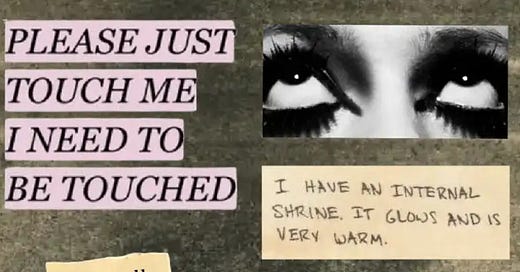Rage & Softness is reader-supported! Thank you to the folks who pay monthly to support my work. If you want to upgrade to paid, go here.
Add your favorite song to the newsletter Playlist!
Please “heart” or share my writing with your community and comrades! Forward this email to a friend, put it in your own newsletter, screenshot and share it on social media.
If you would like to pay for a subscription, but don’t want to do so through Substack, you can pay via my Venmo or PayPal. Also, if you’d like a paid subscription, but can’t afford it, please email me and I’ll add you—no questions asked.
I cried tears of gratitude the other day. I was coming down from sensory overload after the event I facilitated at my local feminist bookstore. I remember the Sensory Processing Disorder that my psychiatrist had diagnosed me with several years ago. She never gave me any resources and I never looked into it.
This last weekend, I went searching for books about SPD. Most, unfortunately, are made for children. I found a book called, Making Sense: A Guide to Sensory Issues and I read it cover-to-cover. I cried at the accuracy. I cried at how much everything made sense.
As a child, I had many sensory issues (I still do). I remember always feeling overwhelmed by sounds, sights, and touch. My parents would joke that they needed to have me seen by a podiatrist because I would put up such a fight when I would have to wear socks and shoes (I called them “foot prisons”). SPD is a neurological disorder, not a mental health one, that often involves physical symptoms and difficulty with the brain interpreting these symptoms. Mental health counselor Rachel S. Schneider writes about SPD saying:
People with sensory issues usually don’t have issues with sensation, but they struggle with perception and responding appropriately to what the brain perceives.
In a study that Schneider cites in her book, people with SPD brains have white matter (a type of brain tissue that connects different areas of the brain and spinal cord, enabling them to process and exchange information) that is less well connected in areas where it should be, specifically near the back of the brain.
In an article for ADDitude, an online magazine for families and adults living with ADHD and related conditions, writer Janice Rodden explains SPD further by saying it:
disrupts how the brain—the top of the central nervous system—takes in, organizes, and uses the messages received through our body’s receptors. We take in sensory information through our eyes, ears, muscles, joints, skin and inner ears, and we use those sensations–we integrate them, modulate them, analyze them and interpret them—for immediate and appropriate everyday functioning.
SPD affects all eight senses: sight, taste, touch, smell, hearing, vestibular (balance), proprioception (movement), and interoception (internal). Having SPD means it’s difficult to integrate everyday sensations. There are subtypes to SPD. These are: Sensory Modulation Disorder (what I have), Sensory Discrimination Disorder, and Sensory-Based Motor Disorder. With Sensory Modulation Disorder, people tend to crave certain sensations, avoid some, and ignore others. For me, I crave certain touch: I like to feel soft things, textured things with my fingers. I like receiving certain touch from people I love. I avoid: bright lights, lighting that changes drastically, loud noises, large groups/crowds, mixing food, haircuts, heights, head movements, feeling hungry, feeling thirsty, feeling my heartbeat pounding, feeling a full stomach, feeling a full bladder, and excessive body heat. I don’t tend to ignore any of my senses—unfortunately.
Most people with SPD struggle with at least one or more of their eight senses. My primary issues revolve around sight, interoception, and hearing, however like I noted above there are some things that use other senses that I struggle with.
Being out in the world often feels like I’m walking around with a body-sized open wound. SPD is hypervigilance as it relates to any sensory input. Rodden writes:
Many adults describe the feeling as being assaulted, attacked, or invaded by everyday experiences. They are bothered by sounds or textures that most people don’t hear or feel.
People who don’t have SPD are able to habituate to a specific stimuli, so they eventually ignore it or stop paying attention to it. However, those of us with SPD never stop noticing the stimuli. Schneider writes:
It’s as if the sensory input is new each time it occurs.
Doesn’t this sound terribly intense? It is.
SPD, coupled with the hypervigilance I have from traumatic experiences, creates a weight so heavy, so brutally uncomfortable that it almost feels grounding. When I visualize it, it looks like The Ghost of Christmas Yet to Come from the “The Muppet Christmas Carol.” I am the ghost wearing its heavy robes.
SPD anchors me to the world. When it’s especially difficult, I feel afraid of my heartbeat. An octopus has three hearts. Does it notice its heartbeat in all three? How intense that must feel! Noticing and feeling my heartbeat means I’m alive. I don’t always like this, because knowing I’m alive means knowing I could die at any moment. Knowing I’m alive means dealing with the possibility of immense discomfort and distress due to sensory overload at any second.
Learning about SPD and seeing it in my day-to-day, second-to-second lived experience has made me feel seen in a way I haven’t felt before. There is something so beautiful and peaceful about that fact that this is something I can’t fix or change. I can only surrender to it. I can only continue to learn how to live beside it.
what it's like to make a disabled QTBIPOC writers' residency/ body as lab/ some announcements -
Love in the Time of Stripping -
When a Friend Breaks Your Heart -
Climate change is worsening symptoms of Long Covid and POTS. Here’s how people are navigating it. - Fiona Lowenstein
Israel’s Morning Prayer Massacre Is Part of an Escalation of Attacks on Schools - Sharon Zhang
COVID data quietly disappears while cases rise - Ash Peterson
What’s Missing in Conversations about Libraries and Mental Illness - Morgan Rondinelli
Making Space for Palestinian Happiness - Nabil Echchaibi
Love me some Odie Leigh:










great article on an overlooked problem , that effects many .Lachrista . hugs and peace
This is interesting. I’m not sure if it applies to me, but I definitely think I have something going on. Do any of the types discuss aversions to temperature? I cannot stand the sensation of being cold or cold air on me.